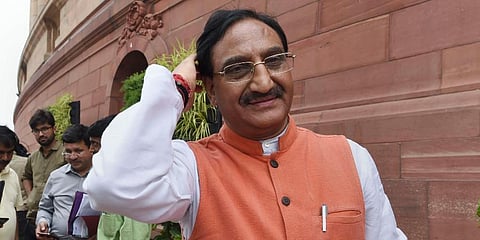

Mahatma Gandhi’s message of truth and non-violence is still relevant for the peace, progress, and development of the world,” Prime Minister Narendra Modi stated while addressing the 74th United Nations General Assembly (UNGA) at Mahatma Gandhi’s 150th birth anniversary last year. In this article, I would like to focus on National Education Policy (NEP) and how it relies heavily on Gandhiji’s thought.
To revolutionise the education system, Gandhiji started for “a true system of education”. The experimentation started from Tolstoy Farms, where the seeds of Nai Talim (new education) were sown. Post coming back to India, his work in Wardha and Sevagram enabled him to set up the roots of the basic education system — a system where education is free and compulsory, provided in the mother tongue. The process of education was centred on manual and productive work, which is close to the child’s environment.
Gandhiji’s efforts emerged as the magma of education revolution fulfilling his dreams of an education system where the students are prepared for national society with the roots entrusted in economic, political, cultural good of the nation with truth and non-violence as the basic tenets. His experiments provided imperishable insights that are relevant to date. Gandhiji’s principles do not just belong to India but the whole world. Therefore, while interacting with DG, UNESCO, I reiterated the message of truth and non-violence to be spread for the world as a whole.
The National Education Policy, also, embellishes the vision of Gandhiji while paving its strategies for meeting the 21st century needs and demands. There are four ways that his system of education appears to be pertinent to present debates on education both in India and across the globe. The first is ‘education for peace’. The students should be prepared for the peaceful and cooperative living. Nai Talim was the expression of the same.
The fundamental principle of the NEP is to develop good human beings capable of who can contribute to the development of a plural, yet equitable and inclusive society with the qualities of rationality, compassion, empathy, resilience, scientific temper and creativity along with upholding of ethics and values. The second point Gandhiji emphasised was that the mother tongue should be a central place in education as a child learns best in his mother tongue. He believed that teaching in a foreign medium deprives the students of the spiritual and social heritage of the nation.
Echoing his principles, the NEP promotes multilingualism while stating that ‘wherever possible’, the medium of instruction should be the mother tongue, home/local/ regional language. A multitude of initiatives has been proposed in the NEP for the promotion and conservation of the languages of India.
Thirdly, he believed that manual training is the only means of stimulating the intellect. Vocational education should not be taught mechanically but scientifically.
The dignity of labour should be protected. With the advent of NEP, there will be no rigid separations between arts and sciences, between curricular and extra-curricular activities, between vocational and academic streams. The NEP sets the target aligning with Gandhiji’s vision that by 2025, at least 50% of across the school and higher education system will be provided exposure to vocational education. The integration of vocational education will start in middle school and will be adequately incorporated into higher education in a phased wise manner.
Lastly, the real goals of education cannot be obtained without a teacher. A teacher is the bedrock of the education system. Gandhiji believed that the teacher must touch the heart and soul of the students while channelling their aspirations. The teacher must be adequately paid. The Ministry of Education 2022 will develop national Professional Standards for Teachers as recommended in NEP. The standards would help to determine aspects related to teacher career management, including tenure, professional development efforts, salary increases, promotions and other recognitions.
I can draw endless similarities between Gandhiji’s vision and NEP and each point makes me realise that the type of the education system shaped by him holds it meaning even today. It is a foundation for us to beacon the aspirations for the 21st century. The education policy propagates 5 Is — Indian, International, Impactful, Interactive, Inclusive. Thus, I propose that we should mark the 151st birth anniversary of Gandhiji by inviting the states, academicians, VCs, teachers and parents for shaping the holistic development of students.
Ramesh Pokhriyal Nishank
Union Minister for Education